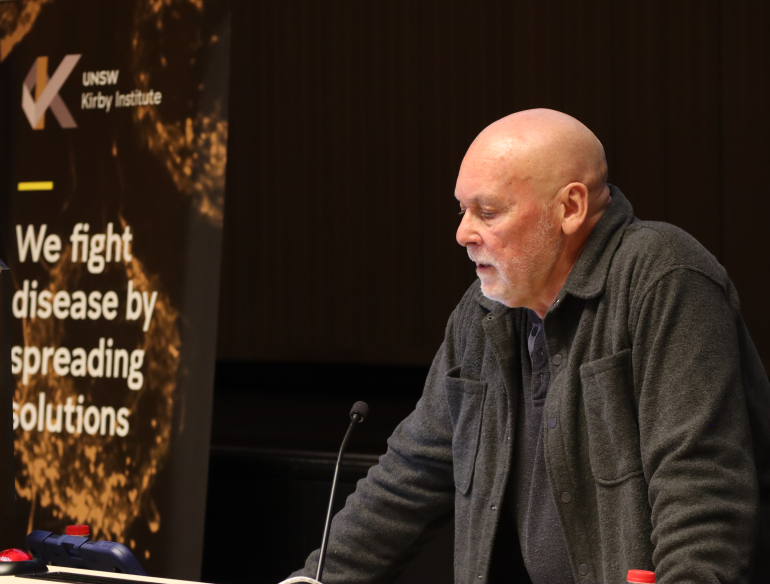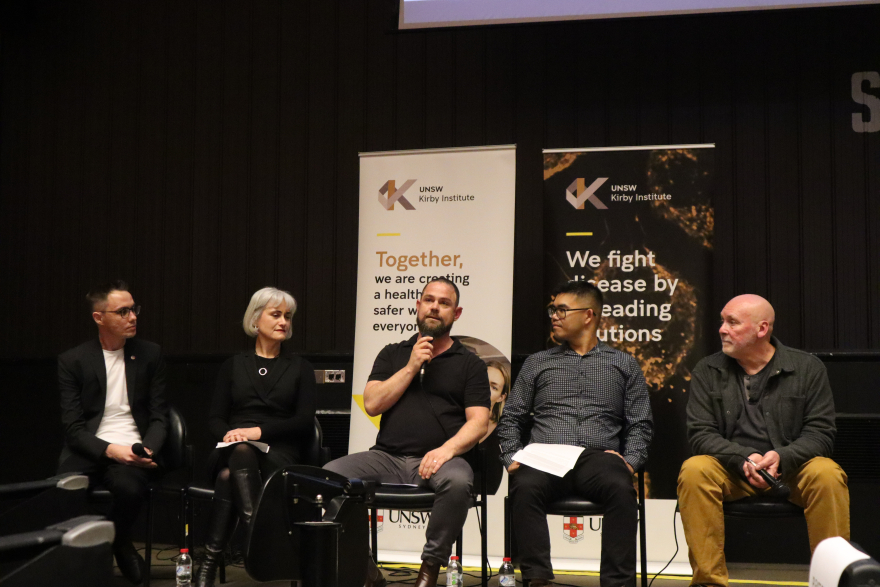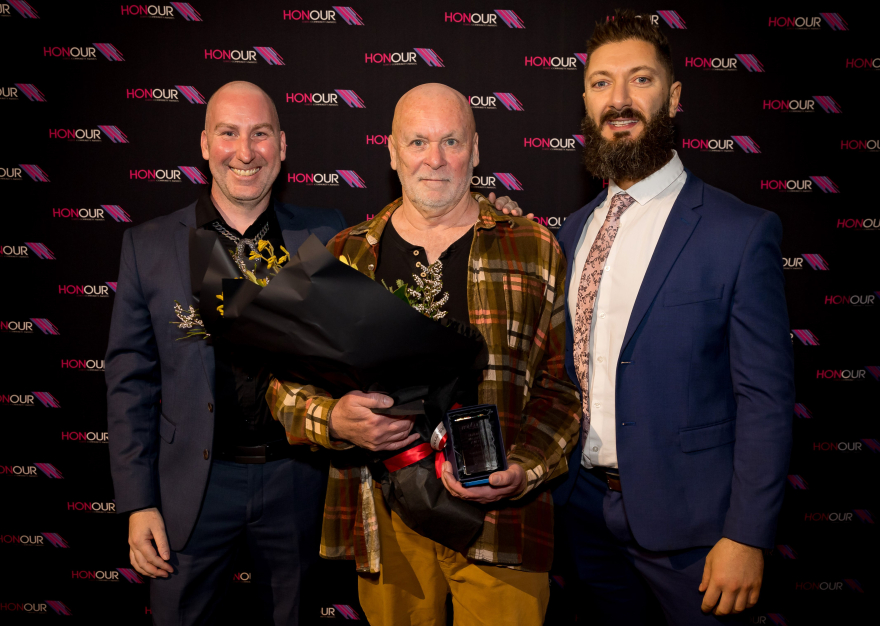In reflection and celebration of his 32-year research career, and over 40 years working in health and activism, Associate Professor Garrett Prestage was awarded the 2023 Brett Tindall Memorial Lecture, an annual lecture held by the Kirby Institute in honour of the late Dr Brett Tindall, one of the Kirby Institute’s early researchers who made seminal HIV discoveries. Dr Tindall died of AIDS in 1994, aged just 33.
Colleagues, friends and family of A/Prof Prestage gathered in the Science Theatre at UNSW on Thursday 24 August at an intimate gathering, where they heard some of the extraordinary career highlights of a community leader and champion for health.
Since 1976, and as a prominent 78er, A/Prof Prestage’s work has had far-reaching impacts on the rights and health of gay and bisexual men. He transitioned into research from 1982 and since then, his work has centred on behavioural research, with the needs and experiences of the gay community informing his approach.
“When I speak of community, I don’t mean just some collection of individuals who share a common characteristic or behaviour or circumstance. They also understand that they share a common bond, and are committed to supporting and enhancing each other’s lives, even in the face of adversity.”
Initially, he was employed by the City of Sydney as a youth worker, to develop support services for vulnerable gay and lesbian youth. With a group of volunteers, he set out at night to give advice and referrals, and from there, secured funding for research into drug and alcohol use among young gay people. The surveys of this group revealed significant levels of vulnerability.
“My purpose in doing that research wasn’t just to collect information and play with numbers, or people’s words. I wasn’t even on an academic track then. I was a youth worker and a community activist, who just happened to have some research skills. My purpose was to establish a self-sufficient gay youth service that could address the vulnerabilities of young gay men and young lesbians.”
This early work gained media traction, calling for government support for vulnerable gay youth, and the organisation Twenty10 was born which still provides critical support to LGBTQI+ youth today.
Tackling a major community health challenge: HIV/AIDS
When HIV/AIDS emerged in Australia, A/Prof Prestage focused his attention on the virus that was ravaging the gay community.
“Although the gay community had become much more visible in Sydney… it was still true that being gay in Sydney was like living within a small town, even if it was mostly right in the heart of the city. So, when gay men started to get sick and die, it had a profound effect on the community… It was both frightening and devastating. We were in the midst of a plague, and it was destroying our communities.”
Building upon his previous work in lesbian and gay men’s health and wellbeing, he was approached by NSW Health to conduct a needs assessment of gay men in relation to HIV, and from there, A/Prof Prestage was responsible for the development of sometimes controversial, but highly effective health campaigns targeted at gay men, with the impetus of providing important health information while challenging stigma.
“The main response to HIV had so far been all rules and regulations, and telling people what not to do. But our belief was that the community response needed to be focused on mutual support and helping people feel good about themselves and finding ways to still celebrate themselves.”
A/Prof Prestage employed this community-centred, needs-based and stigma-challenging approach to his research, and in 1992, was employed by the Kirby Institute, by a selection panel including Dr Brett Tindall, to run one of Sydney’s first gay men’s cohort studies. A/Prof Prestage has since led a number of important community studies which have gone on to inform health policy, provide important information to the community, and facilitate links between community and research that have led to better health outcomes.
These studies have included Sydney Men and Sexual Health (SMASH), Health in Men (HIM), Following Lives Undergoing Change (Flux), and the Gay Community Periodic Survey (GCPS), which still runs today. Each of these studies has collected important data that have shed light on the behaviours and social patterns related to health, and informed approaches to mitigating negative outcomes while empowering the community and destigmatising behaviour.
In reflecting on how far community-centred health interventions have come over the past three decades in Australia, A/Prof Prestage pointed to some successful interventions including condom use in brothels, and the distribution of clean needles for injecting drug users, as examples of how the value lies in interpreting data, not just simply collecting it.
“None of that is about some sterile notion of community that’s just a collection of individuals categorised by some particular characteristic. It reflects a highly political concept of community where the rights and real experiences of the individuals who comprise those communities are paramount.”
Honouring a leader in health
The Lecture concluded with a panel discussion, chaired by Scientia Professor Andrew Grulich, who has worked with A/Prof Prestage throughout his time at the Kirby Institute. Brent Clifton (NAPWHA), Curtis Chan (Kirby Institute), Dr Bridget Haire (Kirby Institute), and Matthew Vaughan (ACON) paid tribute to their colleague, sharing how his passionate, sometimes disruptive, but thoughtful approach to his research has had far-reaching and tangible impacts for both the LGBTQI+ community and the HIV-positive community.
“In listening to Garrett’s talk, I have been reflecting on how normalised health promotion was when I came out and also moved into the HIV sector, in the third and fourth generation of the epidemic,” said Mr Clifton. “To see that research and community were symbiotic; that one did not happen without the other. I’ve learned over the years how HIV had been the exception in participatory health advocacy, and groups of [affected] people really demanding to be at the table.”
“[Something] that resonated the most is that community shares a struggle; there is a sense of values that comes from being in a community of people who have gone through something,” he said.
Left-Right: Matthew Vaughan, Dr Bridget Haire, Brent Clifton, Curtis Chan, A/Prof Garrett Prestage.
On Wednesday 23 August, the night prior to the Brett Tindall Memorial Lecture, A/Prof Prestage was awarded the Health & Wellbeing Award (presented by St Vincent’s Hospital Sydney) at the ACON Honour Awards. He was nominated by his Kirby Institute colleagues for 'devoting his life and career to LGBTQ+ health and wellbeing and for leaving a legacy of knowledge and excellence for the next generation of LGBTQ+ health and HIV researchers.'
Of the award, and on the occasion of his retirement Kirby Institute Director, Professor Anthony Kelleher said: “Garrett has had an important, sometimes colourful, and vastly impactful career as a beloved mentor and supervisor, having seen through dozens of Higher Degree Research students; a wise counsel; a determined researcher; and a passionate advocate for the health, rights and wellbeing of his community. It is fitting that ACON have recognised him with an Honour Award, and I congratulate him on an impactful and exceptional career.”
A/Prof Garrett Prestage (centre) at the ACON Honour Awards alongside two of his nominators, Dr Benjamin Bavinton (left) and Dr Mo Hammoud (right). Credit: Mark Dickson/ACON.


